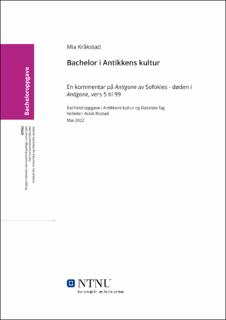| dc.contributor.advisor | Rostad, Aslak | |
| dc.contributor.author | Kråkstad, Mia | |
| dc.date.accessioned | 2023-06-27T17:20:03Z | |
| dc.date.available | 2023-06-27T17:20:03Z | |
| dc.date.issued | 2023 | |
| dc.identifier | no.ntnu:inspera:144931719:66733993 | |
| dc.identifier.uri | https://hdl.handle.net/11250/3073740 | |
| dc.description.abstract | I denne oppgaven skal jeg se nærmere på Sofokles greske tragedie Antigone, og har valgt å se nærmere på temaet døden og begravelse tradisjoner. Jeg skal kommentere på de første 99 verseavsnittene i Antigone. Jeg har valgt disse versene da både døden og gamle begravelsestradisjoner blir nevnt i forskjellig grad og jeg syns de er svært relevant til min oppgave. Antigone er den tredje boken i trilogiene om Oidipus kongen av Theben og hans tidligere liv.
Antigones grunnleggende tema og handling er noe som er like viktig i dag som i antikken, nemlig at alle skal få en verdig ending og avslutning på livet sitt. Dette er et tema jeg ønsker å understreke i min oppgave. | |
| dc.description.abstract | In this Bachelor´theis wil i look closer on Sofokles Antigone, and I have chosen the theme death and funeral traditions. I am going to comment on on the first 99 verse lines in Antigone. I have chosen this vesre lines as I find that they fit best with my chosen theme, and I find that they are relevant to my thesis. Antogone is the third book in the trilogy about Oedipus, the king of Theben and his life. Antigones theme through the book is something that is as important today as in ancient time, the right to have a worthy funeral and an ending to life. This is the theme I want to emphasize in my Bachelor theise. | |
| dc.language | nob | |
| dc.publisher | NTNU | |
| dc.title | Bachelor i Antikkens kultur | |
| dc.type | Bachelor thesis | |
